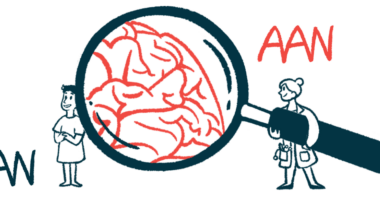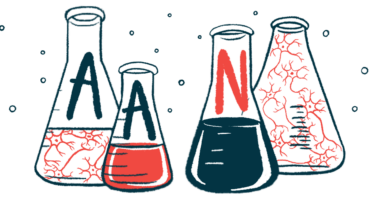Heart damage markers fell for FAP patients on Amvuttra: Phase 3 trial
Findings were compared with participants from Phase 3 APOLLO study

Treatment with Amvuttra (vutrisiran) may ease heart damage in people with familial amyloid polyneuropathy (FAP), a new analysis of the HELIOS-A Phase 3 clinical trial suggests.
“The totality of assessments in this exploratory analysis of the HELIOS-A study provides evidence of potential benefit of [Amvuttra] on cardiac [heart-related] manifestations in patients with” FAP, the researchers wrote in “Impact of vutrisiran on exploratory cardiac parameters in hereditary transthyretin-mediated amyloidosis with polyneuropathy,” which was published in the European Journal of Heart Failure. The work was funded by Alnylam Pharmaceuticals, which markets Amvuttra.
Hereditary transthyretin-mediated amyloidosis (hATTR, or ATTRv) is caused by mutations in the gene that encodes the protein transthyretin, leading it to form toxic clumps that damage organs. In FAP, a subtype of ATTRv, toxic transthyretin clumps accumulate and damage the nerves outside the brain and spinal cord. These aggregates can also accumulate in the heart muscle, causing heart damage.
Amvuttra is an approved injection treatment for FAP that reduces the production of transthyretin. Its approval was based primarily on data from the Phase 3 HELIOS-A trial (NCT03759379), which showed it eased the severity of nerve damage symptoms.
Results of HELIOS-A study
HELIOS-A included 122 adults with FAP who were treated with Amvuttra for 18 months, or about 1.5 years. The study didn’t include a placebo group, but the results were compared with findings from an external placebo group of FAP patients who’d participated in APOLLO (NCT01960348), another Phase 3 trial.
The APOLLO study supported the approval of Onpattro (patisiran), an older FAP treatment made by Alnylam that works much like Amvuttra. Demographic and clinical features of participants were similar in APOLLO and HELIOS-A.
Exploratory measures of patients’ heart health were routinely assessed as part of HELIOS-A, including in 40 patients who had evidence of heart involvement at the start of the study.
Levels of NT-proBNP, a well-established marker of heart damage, decreased over time in the Amvuttra-treated patients, including the cardiac group, in HELIOS-A, but showed a pronounced increase over time in the APOLLO group. A clear difference between the groups was evident by nine months and was statistically significant at 18 months.
Echocardiography assessments to image the heart generally showed trends towards better heart health in the Amvuttra group, including the cardiac group, than the placebo group.
Differences reached statistical significance that favored Amvuttra in some parameters, including cardiac output, which is the total amount of blood the heart can pump out over a given time.
“The observed trends in echocardiographic parameters are notable, as a worsening in echocardiographic parameters … are included in criteria for clinically significant ATTRv … disease progression,” wrote the researchers, who said some of the heart parameters have also been linked with mortality risk in ATTRv.
A subset of 48 patients in HELIOS-A had evaluable data from a cardiac imaging technique called 99mTc scintigraphy, which looks at abnormal protein buildup in the heart. More than two-thirds of them had reduced clumps after 18 months on Amvuttra and this reduction was especially dramatic in those with more severe heart involvement at the start.
There were no reports of cardiac safety signals with Amvuttra and most heart-related side effects were mild or moderate, and not deemed related to the therapy.
While the findings don’t prove Amvuttra can reduce ATTRv-driven damage to the heart, they “serve as an encouraging basis for future longitudinal studies,” wrote the researchers, who said an ongoing Phase 3 trial called HELIOS-B (NCT04153149) is evaluating the therapy’s safety and efficacy in ATTRv patients with heart damage.







